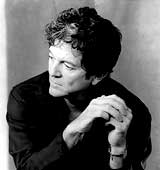
A middle-aged man in full: Rodney Crowell’s songwriting keeps maturing.
|
For Rodney Crowell, there really is life after country radio. He just needed some downtime to figure out what direction it would take.
Crowell’s last few discs — The Houston Kid, Fate’s Right Hand and The Outsider — form the soundtrack of a middle-aged man pausing, taking stock of his life and realizing he still has much to learn — but looking forward to those lessons.
“Some of the characters in these songs do come off feeling pretty dissatisfied with where they’re at, but I think a certain amount of that is healthy,” says Crowell, who comes to the Grey Eagle on Friday.
Crowell’s own dissatisfaction with his music led him, in 1996, to drop out of the Nashville country-pop scene and its relentless pursuit of the Next Big Hit. That decision led to an artistic rebirth — and some of the best music he’s ever produced. That’s saying a lot for an artist like Crowell, who’s enjoyed critical acclaim ever since his 1978 debut — and whose mid-to-late ’80s discs, Diamonds and Dirt and Key to the Highway are generally lauded as country-rock high-water marks. Those albums were also veritable hit factories, with Diamonds and Dirt yielding five number one singles.
But Crowell’s last three records are the strongest of his career, plumbing emotional, intellectual and spiritual depths that Kenny Chesney, Toby Keith and Big & Rich aren’t contractually obligated to comprehend.
His first independent effort — The Houston Kid, released in 2001 — was the most personal recording in a career of a guy who has specialized in them. It revisited — in sometimes harrowing fashion — some of the painful memories of his childhood. The Houston Kid also marked Crowell’s return to a spare sound after having played to a radio audience hungry for lavish arrangements on his slick, mid-’90s releases.
Fate’s Right Hand, in 2003, was a similarly gloss-free affair. But while Houston Kid looked backward, Fate looked inward.
One song from Fate, titled “The Man in Me,” painted a very dark portrait of the inner self. “That was me, 15 years ago,” says Crowell. “I’ll never forget the absolute [emotional] bottom I had hit at that time, and there’s probably someone out there who’s going through the same thing right now.
“But if they make it through the album, and they hear the last song” — “This Too Shall Pass,” a song about acceptance and living in the moment — “then I’ve done my job as an artist, which is to take someone on a journey and give them a resolution.”
Crowell returned to the Nashville majors in 2005 with a Sony-issued release, The Outsider. The guitars were scrappier and gnarlier this time out, the beats tougher and punchier — fitting, since these were some of the more ornery songs in Crowell’s ouerve.
The Outsider — an expression of dismay and disdain at the direction the country has taken under the Bush administration — could be seen as the final act of The Crowell Midlife Trilogy.
In fact, the centerpiece of The Outsider is probably “Don’t Get Me Started,” wherin Crowell sings from the point of view of a regular guy on a barstool who is coaxed into venting a social conscience that’s pretty much on fire — a guy who’s chomping at the bit with moral outrage over $400 billion spent on a Middle Eastern misadventure while Americans get poorer and poorer:
“The rich corporations have turned a deaf ear/ They don’t care who goes hungry/ They’ve made that much clear/ You see the trouble with people/ Is that we want to believe/ But they can’t turn a profit without tricks up their sleeve,” he sings.
Whew. Someone better contact the Democratic National Committee and tell ’em they’ve found the party’s theme song for the ’08 elections.
Crowell’s journey has included some huge losses that, years later, still sting. One was the September 2003 death of his former father-in-law Johnny Cash, who provided inspiration for Crowell when he was sorting out his priorities.
“He was a big soul — a smart, funny, sweet, crazy guy with a lot of demons, but he dealt with them in a way that enabled him to still be a damn decent guy,” says Crowell. “All of us artists should have a town meeting and nominate 40 or 50 of us to try and take up the slack he’s left in terms of integrity, and gravity, and meaning, and for the way he illustrated what a life of integrity of an artist can mean.”
[Writer and critic Kevin Ransom first wrote about Rodney Crowell in 1994. He can be reached at KevinRansom@comcast.net.]
Rodney Crowell performs at The Grey Eagle on Friday, Sept. 15 at 8 p.m. Will Kimbrough and Kree Harrison open. $18-$20. 232-5800.





Before you comment
The comments section is here to provide a platform for civil dialogue on the issues we face together as a local community. Xpress is committed to offering this platform for all voices, but when the tone of the discussion gets nasty or strays off topic, we believe many people choose not to participate. Xpress editors are determined to moderate comments to ensure a constructive interchange is maintained. All comments judged not to be in keeping with the spirit of civil discourse will be removed and repeat violators will be banned. See here for our terms of service. Thank you for being part of this effort to promote respectful discussion.